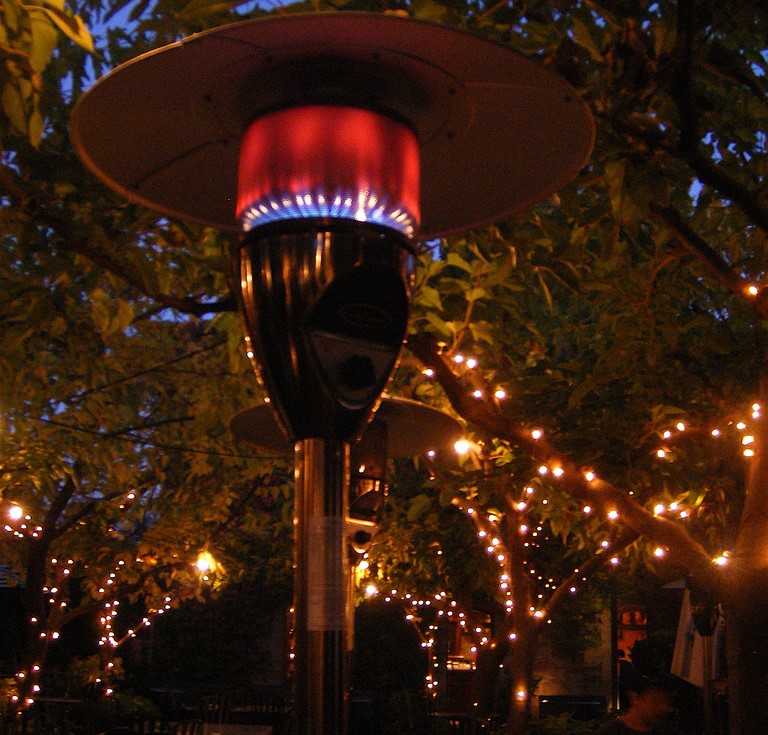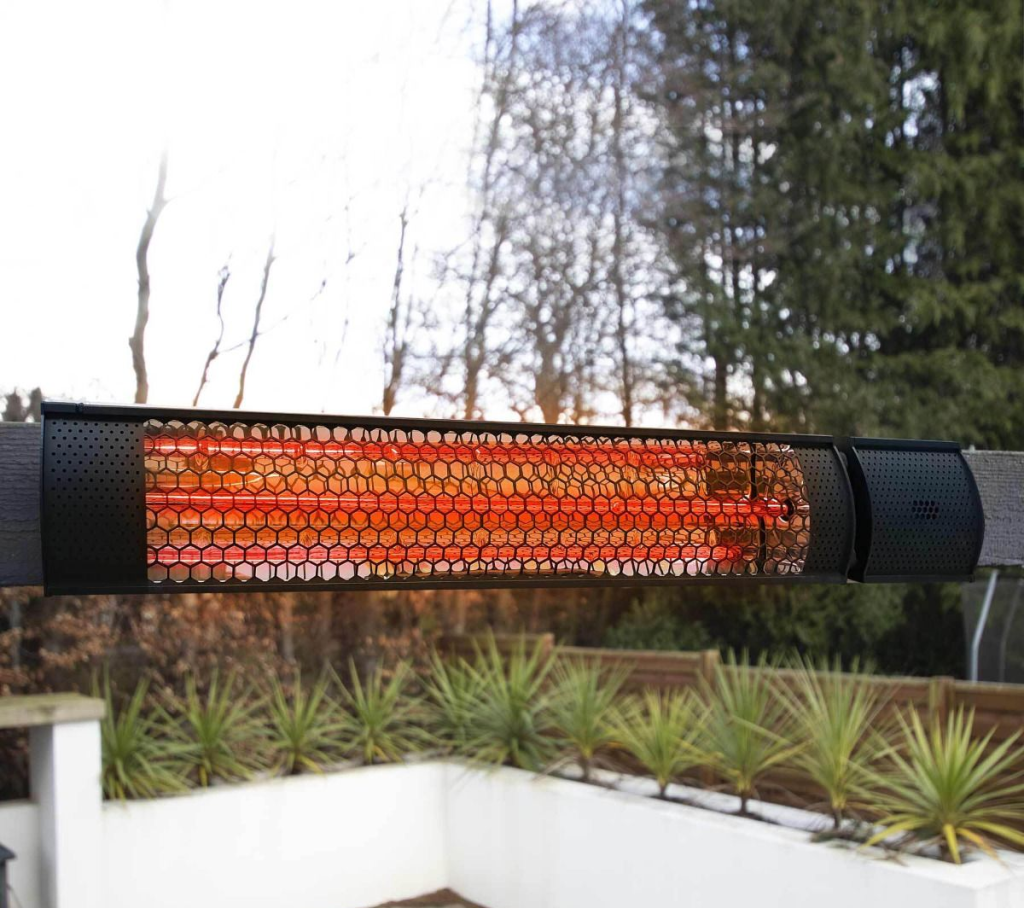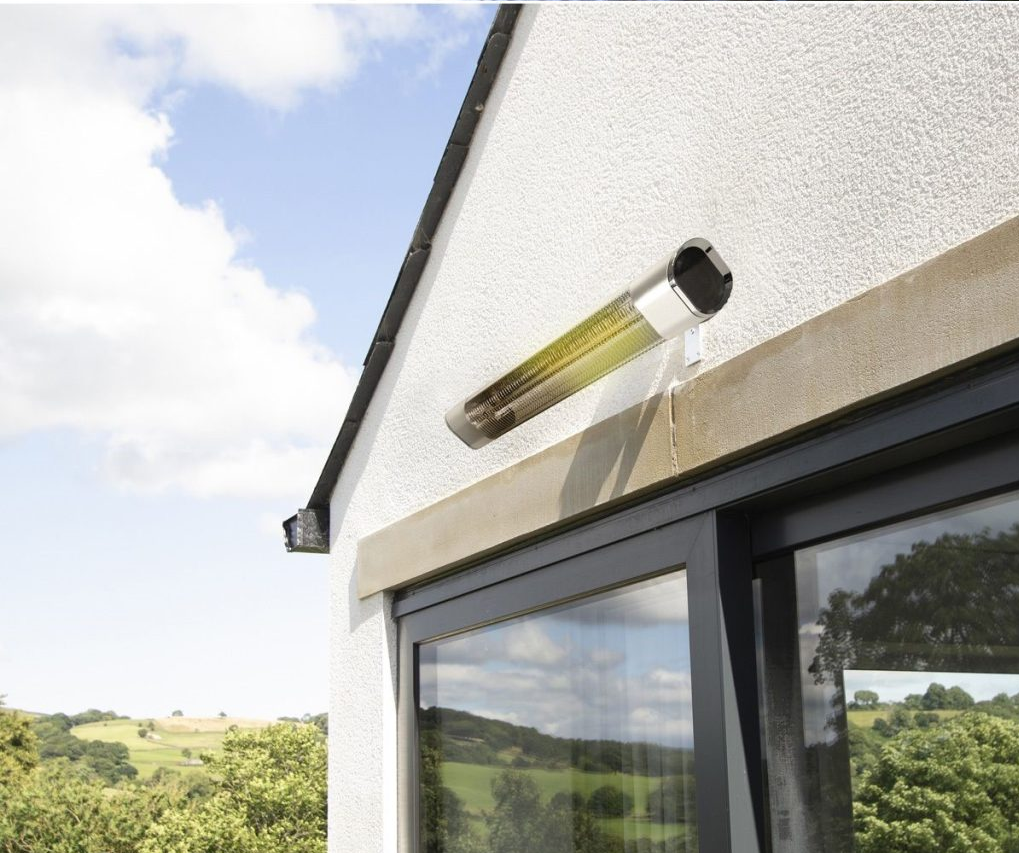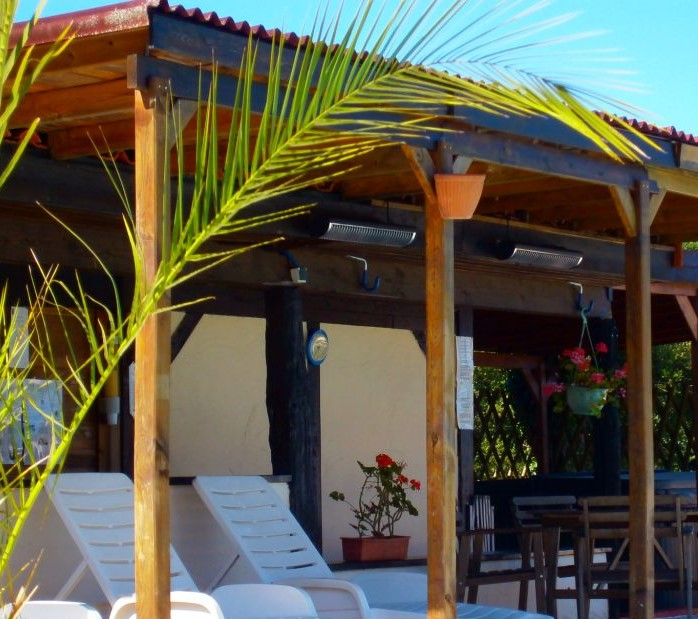Patio heaters are the best way to combat those cooler days and keep your outdoor space useable no matter the season. With so many options on the market – solid fuel, gas and infrared – you might be wondering what exactly sets them all apart. In this blog, we’ll be looking at them individually, breaking down their pros and cons, and exploring which type of outdoor application they’re best suited for. So, whether you’re looking to heat a private garden, bustling restaurant terrace or larger commercial setting, we’re here to make that choice a little easier.
Solid fuel patio heaters
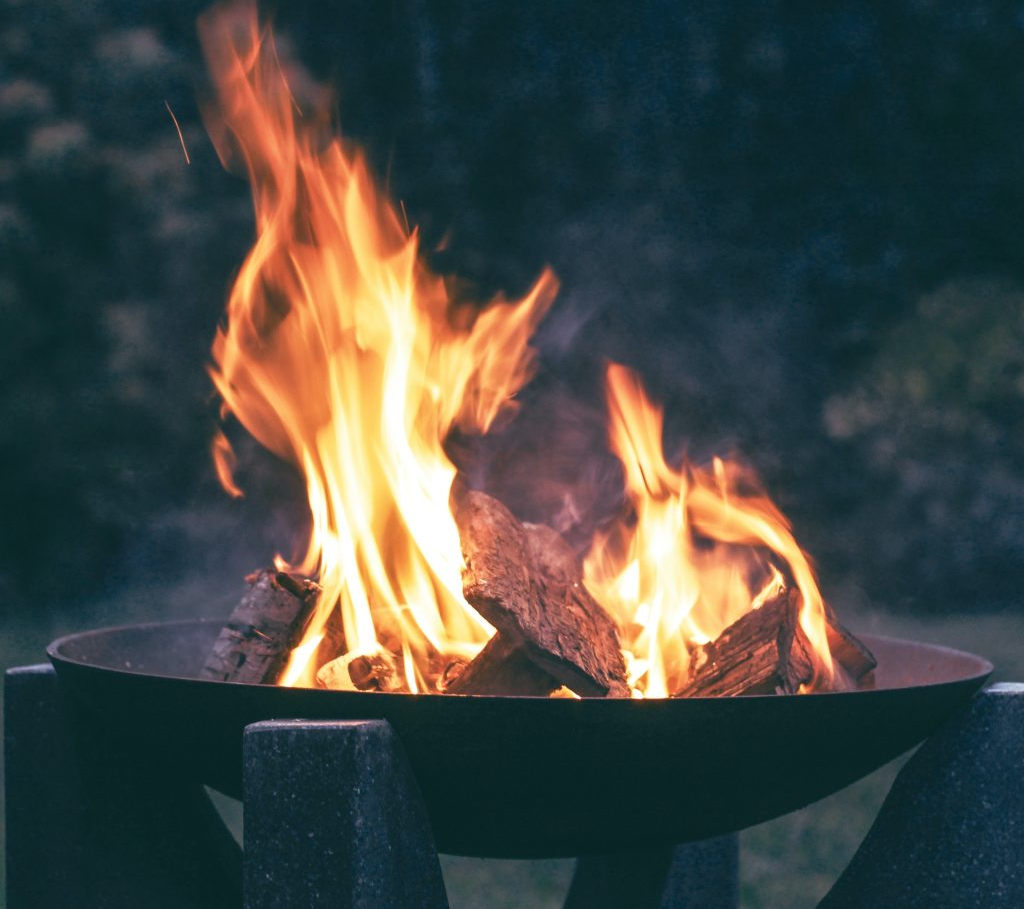
Using a controlled fire to create warmth, solid fuel patio heaters are the originals when it comes to outdoor heating. Whether you opt for a low-key fire pit or a more sophisticated outdoor fireplace, solid fuel heaters require a lot of care and attention to keep them running. You’ll need to maintain the flames throughout, clean after every use, and make sure you have a steady supply of fuel on hand. On the flipside, the multi-functional nature of a fire heater makes them a great option if you wanted to make a night of it – whether that’s for cooking or just enjoying some cosy campfire vibes.
| Pros | Cons |
| Cosy light source | Smoke & fire hazards |
| DIY-friendly | Requires a steady supply of fuel |
| Multi-functional | High maintenance |
| Will make clothes & hair smell | |
| Produces CO2 emissions | |
| Can be difficult to control | |
| Not portable |
Best suited for:
- Occasional use – The cosy, rustic ambience of a solid fuel patio heater makes them ideal for infrequent use – heat up some marshmallows, share some stories and simply enjoy the view. The high maintenance involved means you’ll need to make it a big part of your night rather than just have it running in the background, which is why it’s unlikely you’ll use it every time you’re out.
- Private patios – If you’re trying to heat a commercial space, solid fuel heaters are the worst option. There’s far too much upkeep involved; plus, they pose a safety risk for guests. Private domestic spaces are more suited for using and enjoying this type of patio heater, so long as children and pets are properly minded.
Gas patio heaters
Gas patio heaters, otherwise known as LPG heaters, run on gas cylinders that require replacing after use. If you plan on using your heater regularly, the costs attributed to running a gas heater will rack up, with a 13kg gas cylinder typically costing around £40. However, since you’ll get about 10 hours of use from a cylinder of this size, occasional use should be more than sustainable. Many gas patio heaters are DIY-friendly – their wire-free umbrella-style or table-top positioning are great if you value portability. However, the bright light and CO2 emissions they emit are notorious for attracting mosquitoes and other types of bugs, which can be a definite mood-killer to your cosy evening!
| Pros | Cons |
| Instant warmth | High running costs |
| Versatile designs | Requires a steady supply of fuel |
| Cheap upfront cost | Annual servicing required |
| Easy to use | Attracts bugs |
| Portable options | Produces CO2 emissions |
| Bulky designs |
Best suited for:
- Ventilated areas – In the event of a gas leak, patio heaters located indoors or in improperly ventilated areas could cause serious issues. For this reason, they’re best suited for installation outdoors or in wide, open spaces that see steady air flow.
- Obstruction-free zones – Due to the very high temperatures reached by gas patio heaters, it’s important they’re not installed near anything that can pose a fire hazard. Beneath tents or gazebos are a no-go; same goes for any area that’ll see a heavy amount of foot traffic.
Shortwave infrared patio heaters
Converting electricity into 100% radiant heat, shortwave patio heaters use near infrared to deliver fast-acting, robust warmth. Otherwise known as quartz heaters, they use a powerful tungsten bulb to cut across the cold and counteract any disturbance from air movement. Reaching high temperatures within a few seconds of switch-on, shortwave heaters can be recognised by their distinctive ruby glow. Some shortwave heaters even have customisable heat outputs if you only need a milder accompaniment to your outdoor hangout, making them suited for use throughout the year.
| Pros | Cons |
| Fast-acting, robust warmth | Not suitable for use over long periods |
| Least affected by wind | Produces a distinct ruby glare |
| Suitable for exposed locations | Not as many control options |
| Zero maintenance required | Not as far reaching as other heaters |
| Suitable for DIY installation | Professional hardwiring is required for permanent fitting |
| Carbon neutral when paired with renewable energy | |
| Customisable heat outputs & timers | |
| Versatile installation options – wall, ceiling, freestanding |
Best suited for:
- Exposed locations – As they are least affected by air movement, shortwave heaters can be installed in uncovered areas to deliver fast-acting warmth despite the weather. To ensure protection against the elements, they must be professionally hardwired to a fused spur.
- Smaller spaces – Due to the shorter wavelengths produced by near infrared, this intense heat can only be felt when nearby the unit. For a larger location, multiple shortwave heaters will ensure a greater reach.
- Use over short periods – Due to the intensity of shortwave radiation, they’re best suited for when immediate, short-term heating is required.
Our favourite shortwave patio heater: Ecostrad Sunglo
Mediumwave infrared patio heaters
Considered by many to be the best of both worlds, mediumwave infrared heaters deliver robust yet comfortable warmth, suited for use over long periods. Fitted with mid-temperature carbon filament bulbs, the light they give off is a calming low-glare, designed to be more long-lasting over shortwave heaters. This durability also gives them a leg up over other varieties – they’re up to the task of heating a draught-prone warehouse or semi-exposed patio area, but never run the risk of becoming overwhelming, so you can use them comfortably over many hours.
| Pros | Cons |
| Perfect midpoint between vigorous & gentle warmth | Professional hardwiring is required for permanent fitting |
| Low-glare heating | |
| Suited for use over long periods | |
| Suitable for DIY installation | |
| Ideal for semi-exposed locations | |
| Customisable heat outputs & timers | |
| Carbon neutral when paired with renewable energy | |
| Versatile installation options – wall, ceiling, freestanding |
Best suited for:
- Semi-exposed locations – Mediumwave heaters can withstand a lot of airflow, but as they’re not as robust as shortwave heaters, installation in semi-sheltered spaces such as awnings, pergolas and beneath umbrellas offer the greatest means for performance.
- Mid-sized spaces – With a greater spread of warmth, mediumwave heaters are apt for installation in mid-to-large commercial spaces such as restaurant courtyards and workshops. As they’re intended for continuous use, mediumwave heaters can be left on all day without becoming overpowering.
Our favourite mediumwave patio heater: Stratus
Longwave infrared patio heaters
Longwave heaters use far infrared technology to deliver gentle yet deeply absorbent warmth. Ideal for all-day use, this type of heat feels the most natural – mimicking that of the sun on a pleasant day. Using ceramic heating elements instead of a bulb, longwave infrared patio heaters give off no glare whatsoever, guaranteeing total discreetness. Their ineffectiveness against wind and slower warm-up times means they’re less suited than other infrared heaters for impromptu heating, so if you’re looking for a traditional patio heater to simply heat your outdoor space, you’re best suited opting for an alternative.
| Pros | Cons |
| Gentle, soothing warmth | Takes longer to warm up |
| Zero light output | Not suitable for exposed locations |
| Far-reaching and long-lasting heat | Professional hardwiring is required for permanent fitting |
| Suitable for DIY installation | |
| Carbon neutral when paired with renewable energy | |
| Versatile installation options – wall, ceiling, freestanding |
Best suited for:
- Large, sheltered locations – The longer wavelength of far infrared is more easily affected by air flow, so it’s best to avoid installing in exposed outdoor locations. Instead, open-air transition rooms, al fresco dining settings and lofty interiors such as yoga studios would benefit most from this gentle yet durable heater.
- Use over long periods – Far infrared heats on a deeper level, with people and objects able to absorb and re-radiate that warmth back. Their heat-retentive ceramic plates will continue giving off heat long after the heater has stopped drawing power, maximising efficiency and giving you the most for your money.
Our favourite longwave patio heater: Herschel Aspect XL
Overhaul your space with an infrared patio heater
The unmatched versatility of infrared makes installing one in your outdoor space a no-brainer. For small, private patios that require heating on an ad-hoc basis, why not opt for a shortwave heater? Or perhaps you’re looking to keep guests warm in your pub garden? A mediumwave heater would do nicely. Of course, if you have a large, lofty space that struggles to maintain temperatures, longwave heaters are your best bet. With a wide range of designs, programming options and installation variety on offer, we have an infrared patio heater for you.


